2009 Graduate Business Forum
2009 Graduate Business Forum
In a recent interview Dr. Jan-Juy Lin, National Chengchi University’s new IMBA director, described his focus on making National Chengchi University a locus for international study. Under that vision National Chengchi University just finished hosting the 2009 Graduate Business Forum held in Taipei April 15th to the 19th.
Established in 1983 previous Graduate Business Forum host schools have been among the world’s leading institutions.
Berkeley, Case Western Reserve, Columbia University, Copenhagen Business School, Cornell, Duke University, Emory, Indiana University, National University of Singapore, New York University, Northwestern University, UCLA, University of Michigan, University of Texas, University of Virginia, University of Washington, Vanderbilt University, Washington University, Western Ontario, the Wharton School of Business.
National Chengchi University has joined that group.
The program is “dedicated to bringing together student leaders from graduate business programs worldwide, assembling them for inspirational dialogues, debates and best practice sharing at annual Graduate Business Conferences (GBCs), then keeping them connected in a global network of peers, alumni and inspirational leaders.” [1]
And, the topic could not have been more timely nor more attractive to today’s students: Accessing the Market of Greater China. Here is just a partial list of the speakers & many topics covered:
April 16th
Welcome
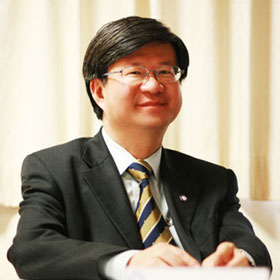
Dr. Se Hwa Wu, President of NCCU
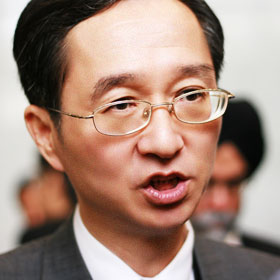
Dr. Robert Su, Professor and Dean, College of Commerce
Cross Strait Relations
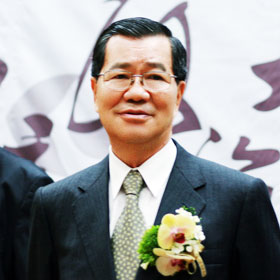
Vincent Siew, Taiwan Vice President
Winning in the Flat World
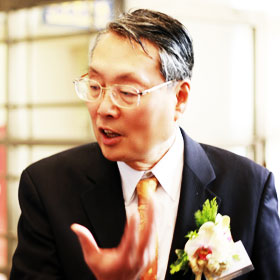
Stan Shih, Founder of the Acer Group / Chairman of iD SoftCapital Group
Leadership and Confucianism
Mr. S.H. Lee, former VP for Human Resources, TSMC; former VP for Asia Pacific, Lucent Technologies; former General Manager for Greater China, Polaroid Corporation; former Country Manager for China, GE Medical Systems; former Regional Manager for South East Asia, Du Pont Corporation.
April 17th
Financial Crisis Overview
Barry Lam, Founder and Chairman of Quanta Computer
Mr. Ted Chang, VP Quanta Research Institute
G=ME2 Strategy & OLPC Vision
Mr. Michael Coye, Chief Risk Officer, Standard & Chartered Bank
Mr. Carl Wegner, Head of Transaction Banking, Standard & Chartered Bank
Tony Phoo, Economist, Standard & Chartered Bank
Professor Edward H., Chow
April 18th
Local & International Companies: Accessing the Greater China Market
Mark Han, CEO Great Wall Food Group
Dr. Joseph Hu, Standard & Poor’s Country Manager, China
Nicholas Windsor, CEO HSBC, Taiwan
From the Vice-President of Taiwan to the CEO’s of the world’s largest companies National Chengchi University students came together with the business leaders and leading business students from around the world. Accessing the Greater China market – perhaps no topic could be more pertinent.National Chengchi University ’s hosting of the conference, along with its present pre-eminence in research & academics – done in an all-English curriculum – shows that it is fast taking its place as greater China’s leading international school of business.
The 2009 Graduate Business Forum: Peter Kiaer, President & C.E.O.; Niall O’Hea, Chairman; Clifford Dank, Vice-President; Andrew Dickinson, NCCU Organizing Chair
Having so successfully brought the Graduate Business Forum to Taiwan we spotted three of the group’s leaders who took time to discuss their expectations for the conference. Then, we had the chance to hear National Chengchi University's own organizing chair address the group.
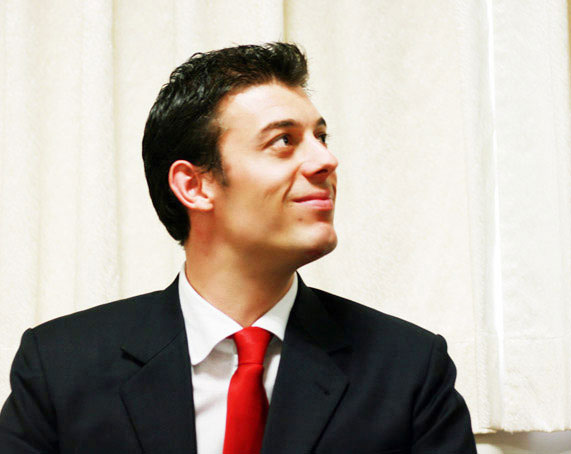
Peter Kiaer is from Denmark, a 2007 Graduate of the Copenhagen Business School with an MBA in Business Administration & Philosophy and was president of one branch of the school’s student government.
Kiaer’s initial involvement with the Graduate Business Forum was in 2005. In 2006 he was the Organizing Chair.
Part of Kiaer’s MBA was completed at New York University’s Stern School of Business, also a Graduate Business Forum member school.
Kiaer is today a management consultant at the PA Consulting Group – a UK based consulting firm with some 3,500 employees in 35 countries focusing on the northern Europe, the Middle East and the Americas. Kiaer consults in the areas of development, organizational development & strategy execution across all sectors of industry.
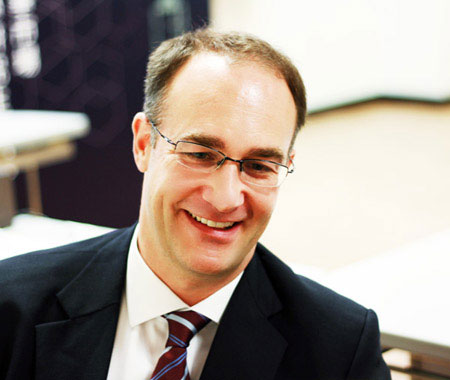
Niall O’Hea is a 2007 graduate of the Manchester Business School & was president of his class.
O’Hea’s first experience with Graduate Business Forum was in 2006 in Denmark when Kiaer’s school, the Copenhagen Business School, was hosting. From then O’Hea joined the leadership committee and then becaming chairman. Before returning to business school O’Hea’s 1st career was as a chartered civil engineer, a field he was in for 12 years. Today he is product manger for the European operations of American Express.
What do you think about Taiwan’s business environment?

Peter Kiaer
The western economies and the western types of thinking have been dominating the world for many years now. There seems to be – I think going forward you’ll see a much more multi-dimensional global world where different views will try to dominate and get influence in China and the greater Chinese region. [This] is something you need to look at. And Taiwan, for example, which has done superb and for many years I think that will gain more and more interest. What are Taiwanese doing that is working so well? And, what can we learn from it? Because, the western world will see now that ‘OK. We thought we had the model. But, something went wrong. Let’s look outside and see who else has done something that works and see what we can learn from that.’
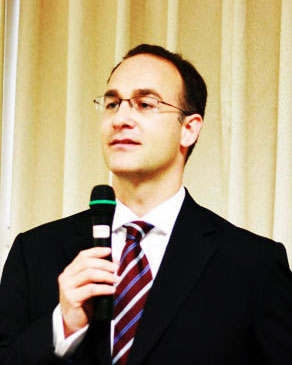
 Our experience [in Taiwan] has been people are speaking English.
Our experience [in Taiwan] has been people are speaking English.
Niall O’Hea
Our experience [in Taiwan] has been people are speaking English. We were in the south of the island and, generally speaking, they could speak enough English. So, we could do whatever we wanted, and that makes it so easy for us, then, to [come back to Taiwan]. And obviously that’s the start. I think a lot of the people here will suddenly realize ‘Wow! These people speak English.’ Once you’re comfortable and there’s trust – business happens.
 Once you’re comfortable and there’s trust – business happens.
Once you’re comfortable and there’s trust – business happens.
Kiaer
It’s easy to be here. If you want to…do business, etc. – I mean, language means a lot.
What do you think the future of the greater China market will be? What do you think the Chinese opportunity and hand how the Chinese should go to the western world?
O’Hea
See – that’s interesting because obviously we will know a lot more about China by Sunday.
Kiaer
Even Saturday
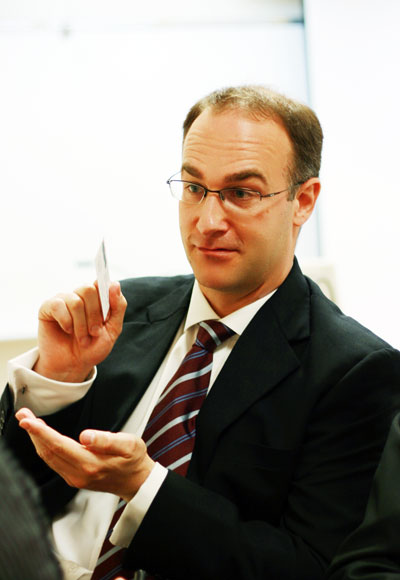
 Because…the conference is teaching us “Accessing the Chinese Market” – its teaching us about China and I think that’s one of the things.
Because…the conference is teaching us “Accessing the Chinese Market” – its teaching us about China and I think that’s one of the things.
O’Hea
Because…the conference is teaching us “Accessing the Chinese Market” – its teaching us about China and I think that’s one of the things: where we have the press telling us all these things going on. We are going to get, now, the view from greater China: about what it’s like looking our way, and an introduction to their country, their region. I think that’s very important.
 We are going to get, now, the view from greater China: about what it’s like looking our way.
We are going to get, now, the view from greater China: about what it’s like looking our way.
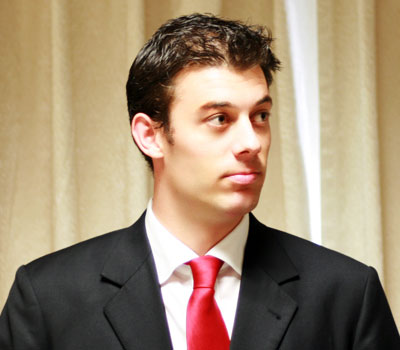
 How are we going to solve this issue of consumption? That’s going to be a big, big global discussion.
How are we going to solve this issue of consumption? That’s going to be a big, big global discussion.
Kiaer
You can say that there is two dimensions, right? China as a producing [and] manufacturing [region], – and increasingly Taiwan for example also knowledge intensive work…. And then there’s… the consumer [side]. I mean: most parts of China today – they are not really heavily consuming anything. Going forward, that’s going to change a lot. With the increasing technology, and people getting access to all kinds of information they can see you can see, to an increased extent, how things are in the U.S., in Australia and Singapore and all that. And, you want the same. So, knowing that [Chinese people are] comprising 25% of everybody on this planet, consumption is going to be the key word for the next 20 years…because if the Chinese are going to consume just as much toilet paper as the western world is doing today there’ll be no trees left on the planet. So – if you should not use toilet paper to the same extent as we do, or we should cut down? And, anything in between that is something –that’s negotiation, right? Because, I don’t think either of the two extremes is going to happen. So, how are we going to solve this issue of consumption? That’s really going to be interesting. That’s going to be a big, big global discussion.
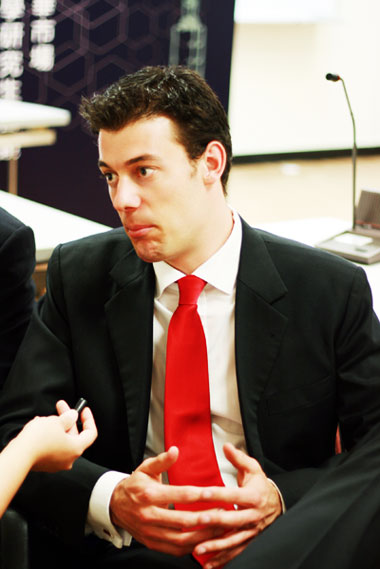
 If [the people of Greater China] want the same consumption as we do – there’s virtually no pure water left on the globe. So, how are we going to solve the problem?
If [the people of Greater China] want the same consumption as we do – there’s virtually no pure water left on the globe. So, how are we going to solve the problem?
Is this the business of environmental protection?
Kiaer
You can’t say consumption without saying environment. Just consuming water, regular water, to the same extent as we do: an average person in the western world uses approximately 100 to 200 liters of water every day. That number is way lower for the average Chinese. If [the people of Greater China] want the same consumption as we do – there’s virtually no pure water left on the globe. So, how are we going to solve the problem? I think that ties a lot into consumption. Because, obviously you would want to consume a lot more, and you should [want that]…
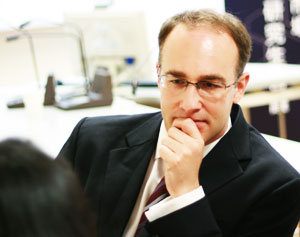
 I notice this when they gave us figures for the spending of GDP on green initiatives – China was number one
I notice this when they gave us figures for the spending of GDP on green initiatives – China was number one
O’Hea
But, it’s interesting, that you can either make the same mistakes that we have: very wasteful, all about consumption, lights, everything or – I notice this when they gave us figures for the spending of GDP on green initiatives – China was number one and you know the UK where, obviously, I was interested: it was right at the bottom, tiny. And, it was just like: these people – who we look at and are very scared that you now are going to consume like we are – are actually taking responsibility to say ‘Listen. We care about the globe. More than you do. Look. Look at this.’ So, that’s very pleasing and, obviously, by Saturday we will know more about what you’re doing.
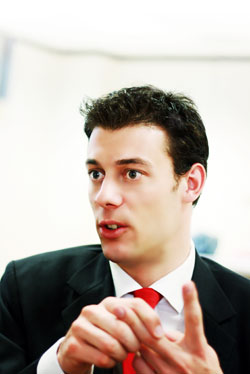
 All the green perspective is a fantastic opportunity, for sure. Because, the whole world is talking about it and we all rationally know that we need to deal with this.
All the green perspective is a fantastic opportunity, for sure. Because, the whole world is talking about it and we all rationally know that we need to deal with this.
Kiaer
All the green perspective is a fantastic opportunity, for sure. Because, the whole world is talking about it and we all rationally know that we need to deal with this. So, the reason we’re doing it at a somewhat slow pace is because it’s very convenient, as it is today. And, it’s a long-term perspective. That’s always difficult in politics – to get people to discuss the long-term perspectives. But, I think [we will see] a lot of business opportunities for China – in taking that leap, and continuing on it because that’s going to set the agenda for the next many, many years.
O’Hea
So, Saturday evening – we’ll be ready!
Clifford Dank – Vice President of the Graduate Business Forum
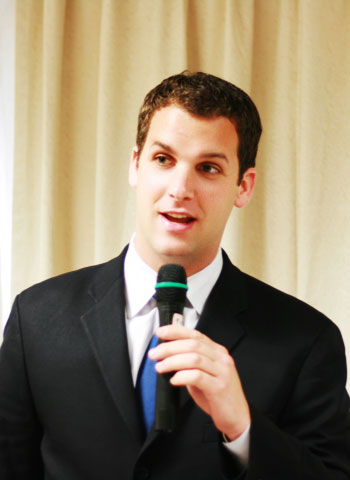
After finishing an undergraduate English major Clifford Dank’s initial career experience was in finance – 5 years as an international equity trader with First New York Securities. Dank enrolled in the Haas School of Business, University of California Berkeley in 2006, receiving his MBA in 2008. He is currently working for the Monitor Group as a management consultant. Monitor Group is a worldwide organization with 1000 employees and 25 offices around the world. Dank’s expertise is in organizational design – helping companies to understand how to support their strategy in terms of influencing behaviors, correct organizational structure and the necessary support systems to execute as efficiently and effectively as possible.
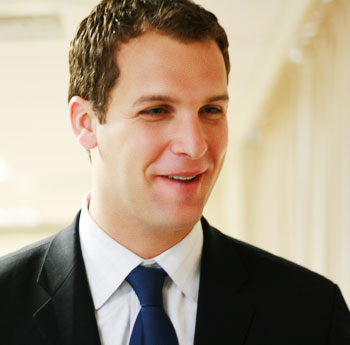
 One of the most important markets in the world right now. Its dynamic, it’s changing, it has a tremendous amount of influence and that influence is increasing every day.
One of the most important markets in the world right now. Its dynamic, it’s changing, it has a tremendous amount of influence and that influence is increasing every day.
What do you think about the greater China market?
One of the most important markets in the world right now. Its dynamic, it’s changing, it has a tremendous amount of influence and that influence is increasing every day. So, you know I think it’s not a new story anymore, the emergence of China, but it’s an ever changing story because the ways in which people interact with greater China…. China is a very broad…so there’s so many different elements of the Chinese market – that depends on the market you’re interested in. But I think every economy acknowledges the importance of China now and in the future as a business partner and as a leader in thought, thought leadership and business thought leadership.
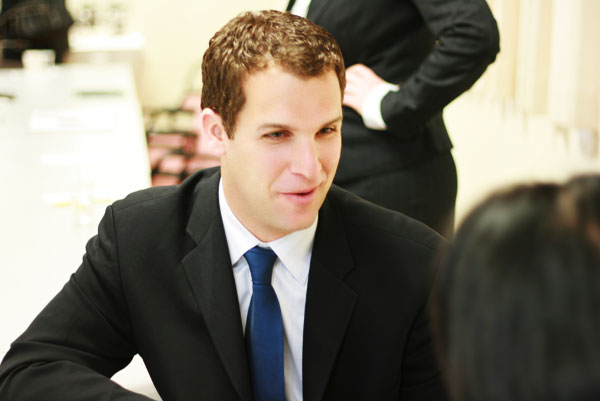
 I think the more the Taiwan continues to build on that core competency and expand other elements of its domestic economy the more people will continue to see Taiwan as an opportunity to explore new business opportunities.
I think the more the Taiwan continues to build on that core competency and expand other elements of its domestic economy the more people will continue to see Taiwan as an opportunity to explore new business opportunities.
What do you think about the business opportunity for Taiwan?
Taiwan has established certain strengths in the past several decades. It’s one of the most well-respected centers for technological innovation. It’s an exporter of high-quality technology products and I think that the world thinks of Taiwan as technologically focused. I think the more the Taiwan continues to build on that core competency and expand other elements of its domestic economy the more people will continue to see Taiwan as an opportunity to explore new business opportunities and to come to in order to progress professionally.
Andrew Dickinson, NCCU Organizing Chair, Addresses the Graduate Business Forum
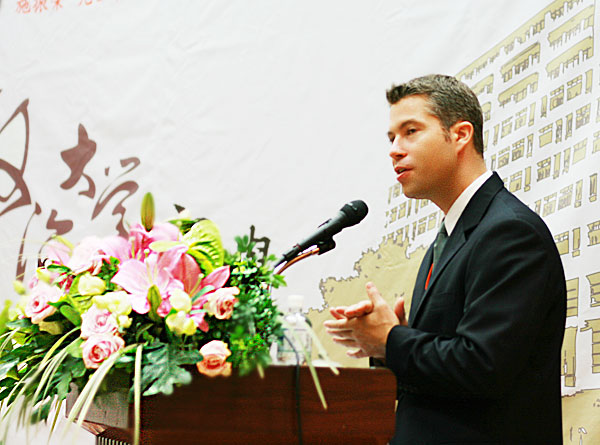
One thing that Cliff mentioned about personalizing the conference on your own – when actually Dr. Chen came to my team and me previously and let us know of this opportunity to host such an amazing event my initial thought was “That’s fantastic! Moving forward – how can we do it? “ As I thought more about it some common themes came together which I’ll explain in a moment which really kind of makes it an incredible opportunity.
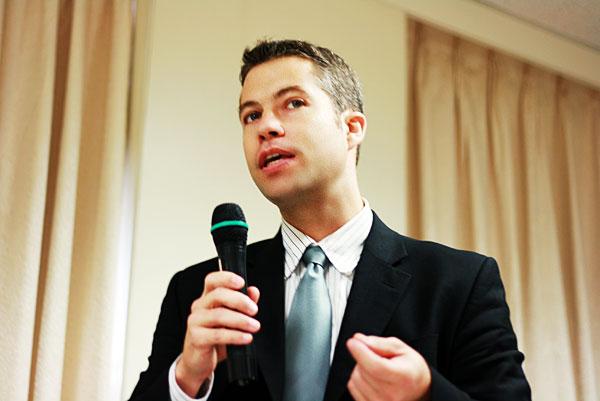
 The most important piece is the culture, the language and the soft skills necessary to excel in the greater China market.
The most important piece is the culture, the language and the soft skills necessary to excel in the greater China market.
The first thing I want to mention is something Peter mentioned, which is all of these people who are coming are already student leaders in their own right and once they finish their education they’ll continue to be the leaders. And that fact could not be more exaggerated or underscored by the fact of everyone here – all of these people – are previous hosts, attendees of the graduate business conference and have enjoyed it to such an amount…they continued on after they graduated…. So, that alone – the amazing amount of time and commitment that these people here give to this organization is phenomenal.
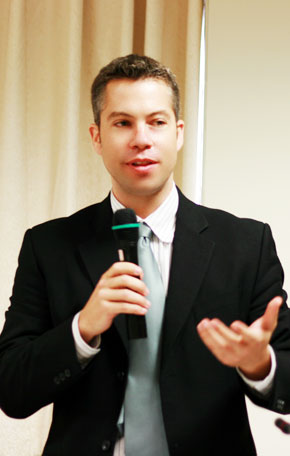
 An opportunity to understand what it takes to excel and succeed in the market of greater China.
An opportunity to understand what it takes to excel and succeed in the market of greater China.
Now, as far as personalizing the conference, one thing that I thought in speaking with Dr. Chen…I thought it’s an incredible opportunity to give this piece that I have learned of Taiwan to as many people as possible and help illuminate this idea of what it means to be here. And that’s...the most important piece is the culture, the language and the soft skills necessary to excel in the greater China market. With that thought in mind my team and I developed a conference that we thought could really highlight these points and give a foundation to these attending delegates from around the world so that they would be able to take this back to their own respective programs and give them an opportunity to share that with their student body. Thereby enhancing everyone’s understanding of the globalized world. But, also giving them an opportunity to understand what it takes to excel and succeed in the market of greater China.

 Taiwan is an incredibly wonderful place.
Taiwan is an incredibly wonderful place.
Taiwan is an incredibly wonderful place. Everyone has been – as Niall said ‘You’re here and you feel like you’re family almost.’ Expressing that, committing that and devoting that to all the delegates and having them take that back – hopefully we’ll make them want to come back to Asia. And, I would just like to say thank you very much Dr. Chen for the opportunity and unbelievable support that you have provided me and my team regarding the Graduate Business Conference. And, of course, the entire GBF staff. Truly, these gentlemen and women are the glue which holds this incredible conference together, and it’s been both a pleasure and an honor. And, I would encourage all of you to please attend the conference beginning tomorrow, Thursday morning. It is unbelievable. If you want to see the dynamics, the excitement that Peter was talking about: it’s easy to talk about it but, when you see it and your experience it – that’s exciting, it’s thrilling, it’s motivating and, in my opinion, most importantly – it’s inspiring. These are qualities that are difficult to come by in one event, and they self perpetuate. And to leave with that and move on with these feelings – I think that’s the true beauty of the Graduate Business Conference.




